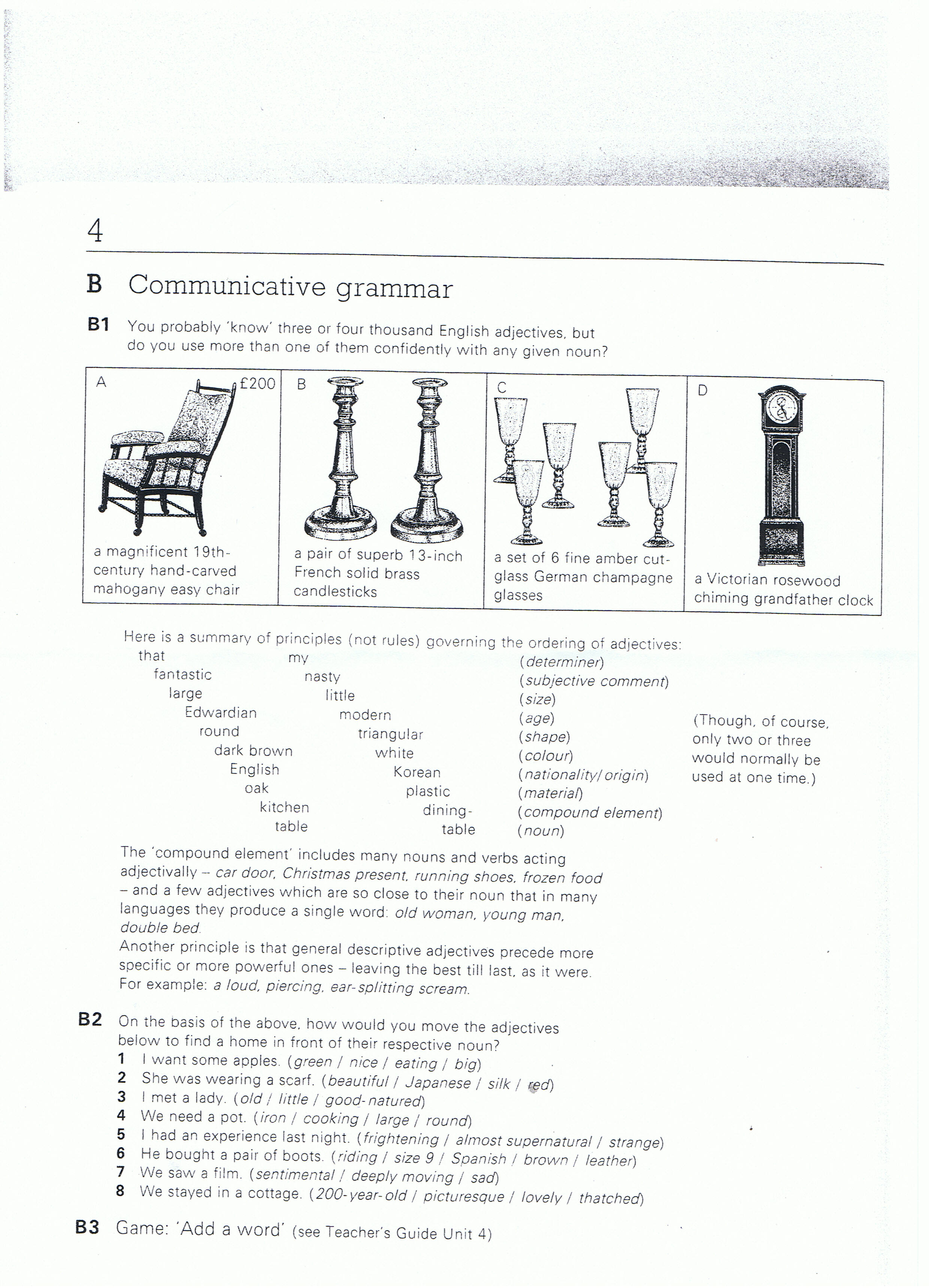CCF20101006�001

B Communicative grammar
B1 You probably 'know' three or four thousand English adjectives. but do you use morę than one of them confidently with any given noun?
|
A ^__n£200 |
1} |
Wf f |
|
J§Pq |
%ll fy | |
|
a magnificent 19th-century hand-carved mahogany easy chair |
a pair of superb 13-inch French solid brass candlesticks |
a set of 6 fine amber cut-glass German champagne glasses |
a Victorian rosewood chiming grandfather clock
Here is a summary of principles (not rules) aoverning the ordering of adjectives:
|
at my fantastic nasty |
(determiner) {subjective comment) | |
|
large |
little |
{size) |
|
Edwardian |
modern |
(age) |
|
round |
triangular |
{shape) |
|
dark brown |
white |
(colour) |
|
English |
Korean |
(nationality/ origin) |
|
oak |
plastic |
{materia!) |
|
kitchen |
dining- |
{compound element) |
|
table |
table |
{noun) |
(Though. of course, only two or three would normally be used at one time.)

The 'compound element' includes many nouns and verbs acting adjectivaliy - car door, Christmas present. running shoes. frozen food - and a few adjectives which are so close to their noun that in many languages they produce a single word: old woman. young man. double bed-
Another principle is that generał descriptive adjectives precede morę specific or morę powerful ones - ieaving the best till last, as it were. For examp!e: a loud, piercing. ear-splitting scream.
B2 On the basis of the above. how would you move the adjectives below to find a home in front of their respective noun?
1 I want some apples. (green / nice / eating / big)
2 She was wearing a scarf. (beautiful / Japanese / silk / r@d)
3 I met a lady. {old / little / good- natured)
4 We need a pot. {iron / cooking / large / round)
5 I had an experience last night. {frightening / almost supernatural / strange)
6 He bought a pair of boots. {riding / size 9 / Spanish / brown / leather)
7 We saw a film. (sentimental / deeply moving / sad)
8 We stayed in a cottage. {200-year-old / picturesgue / lovely / thatched)
B3 Gamę! 'Add a word’ (see Teacher's Guide Unit 4)
Wyszukiwarka
Podobne podstrony:
Writing 1 4B Communicatiye grammar BI You probably know three or four thousand English adjectives,
AF2
Data Set If you selected morę than one data set to search. use the dropdown to see the search result
The style of begging is very aggressive. In groups of three or four they confront indi-viduals, clap
img093 (28) Do you want to get a pet but do not know where to begin? Here are a few ideas to get you
CCF20110611�062 them, saying whether you think.they are objective or subjective. Give your reasons.
You know that college rule - if the professor is morę than fifteen minutes late, class is canceled?
img093 (28) Do you want to get a pet but do not know where to begin? Here are a few ideas to get you
att1395147 MULLET lt s always nice to know you re better than someone.
67255 img093 (28) Do you want to get a pet but do not know where to begin? Here are a few ideas to g
1.5. If you see a foreign film, do you prefer when it is dubbed or when it has subtitles? Why? Do kn
CCF20110521�002 łt I Genetics In each set of three sentences, the same word is missing. Supply the w
CCF20101021�006 Intermediate Language Practice i) You’re surprised that William ha
angielski2 Instraments & eąuipment DO YOU KNOW what the instruments you use are cailed in Engiis
298597 7869429284870 7716215966858S3239r7793478 n trustyourself.you know morę than you think you do.
fd764f37fe0986479a1d4351e5acc8ae How many independent variablcs? One Morę than one
ServiceTechnicians:YOU EARN MORĘ... you RATĘ with the public when you own aPHOTOFACT service data
4/ no tumotier on the account for morę than three months (excluding interest accruai), whete the acc
więcej podobnych podstron